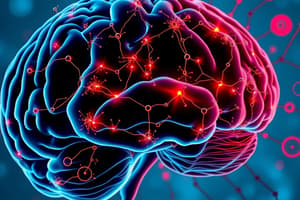Podcast
Questions and Answers
Which branch of psychology focuses on the study of the structure and function of the brain and nervous system?
Which branch of psychology focuses on the study of the structure and function of the brain and nervous system?
- Cognitive Psychology
- Developmental Psychology
- Biological Psychology (correct)
- Social Psychology
What is the primary focus of Behavioral Psychology?
What is the primary focus of Behavioral Psychology?
- The role of genetics in behavior
- Environmental factors that influence behavior (correct)
- Human development across the lifespan
- Mental processes such as perception and attention
What is the key debate in psychology that revolves around the role of genetics and environment in shaping behavior?
What is the key debate in psychology that revolves around the role of genetics and environment in shaping behavior?
- Cognitive vs. Behavioral Psychology
- Experimental vs. Correlational Research
- Classical vs. Operant Conditioning
- Nature vs. Nurture (correct)
What type of research method involves manipulating variables to observe their effects?
What type of research method involves manipulating variables to observe their effects?
What is the primary goal of conditioning, as described in Behavioral Psychology?
What is the primary goal of conditioning, as described in Behavioral Psychology?
Which type of research method is best suited for examining relationships between variables?
Which type of research method is best suited for examining relationships between variables?
What is the primary function of defense mechanisms, as described in psychology?
What is the primary function of defense mechanisms, as described in psychology?
Which branch of psychology examines how people think, feel, and behave in social situations?
Which branch of psychology examines how people think, feel, and behave in social situations?
Flashcards are hidden until you start studying
Study Notes
Branches of Psychology
1. Biological Psychology
- Focuses on the biological basis of behavior
- Studies the structure and function of the brain and nervous system
- Examines the role of genetics, neurotransmitters, and hormones in behavior
2. Behavioral Psychology
- Focuses on observable behavior
- Examines the environmental factors that influence behavior
- Uses techniques such as conditioning and reinforcement to modify behavior
3. Cognitive Psychology
- Focuses on mental processes such as perception, attention, memory, and language
- Examines how people process and interpret information
- Studies decision-making, problem-solving, and creativity
4. Developmental Psychology
- Examines human development across the lifespan
- Studies cognitive, social, and emotional development
- Focuses on factors that influence development, such as genetics and environment
5. Social Psychology
- Examines how people think, feel, and behave in social situations
- Studies social influence, attitudes, and group dynamics
- Focuses on factors that influence social behavior, such as culture and social norms
Key Concepts
1. Nature vs. Nurture
- Debate between the role of genetics (nature) and environment (nurture) in shaping behavior
2. Types of Research Methods
- Experimental research: manipulating variables to observe effects
- Correlational research: examining relationships between variables
- Observational research: observing behavior in natural environments
3. Conditioning
- Classical conditioning: associating stimuli with responses
- Operant conditioning: modifying behavior through reinforcement and punishment
4. Defense Mechanisms
- Coping strategies used to deal with stress and anxiety
- Examples: denial, repression, rationalization, and projection
5. The Biopsychosocial Model
- Understanding behavior as the result of biological, psychological, and social factors
- Recognizing the interplay between these factors in shaping behavior
Branches of Psychology
- Biological Psychology focuses on the biological basis of behavior, studying the structure and function of the brain and nervous system, and examining the role of genetics, neurotransmitters, and hormones in behavior.
- Behavioral Psychology focuses on observable behavior, examining environmental factors that influence behavior, and using techniques such as conditioning and reinforcement to modify behavior.
- Cognitive Psychology focuses on mental processes such as perception, attention, memory, and language, examining how people process and interpret information, and studying decision-making, problem-solving, and creativity.
- Developmental Psychology examines human development across the lifespan, studying cognitive, social, and emotional development, and focusing on factors that influence development, such as genetics and environment.
- Social Psychology examines how people think, feel, and behave in social situations, studying social influence, attitudes, and group dynamics, and focusing on factors that influence social behavior, such as culture and social norms.
Key Concepts
- The Nature vs. Nurture debate is between the role of genetics (nature) and environment (nurture) in shaping behavior.
- Experimental research involves manipulating variables to observe effects, correlational research examines relationships between variables, and observational research observes behavior in natural environments.
- Conditioning involves classical conditioning, which associates stimuli with responses, and operant conditioning, which modifies behavior through reinforcement and punishment.
- Defense Mechanisms are coping strategies used to deal with stress and anxiety, including denial, repression, rationalization, and projection.
- The Biopsychosocial Model understands behavior as the result of biological, psychological, and social factors, recognizing the interplay between these factors in shaping behavior.
Studying That Suits You
Use AI to generate personalized quizzes and flashcards to suit your learning preferences.




